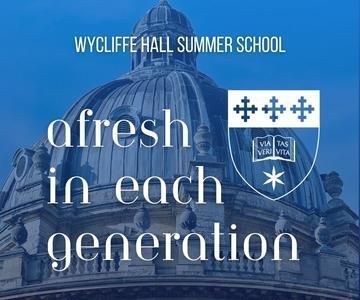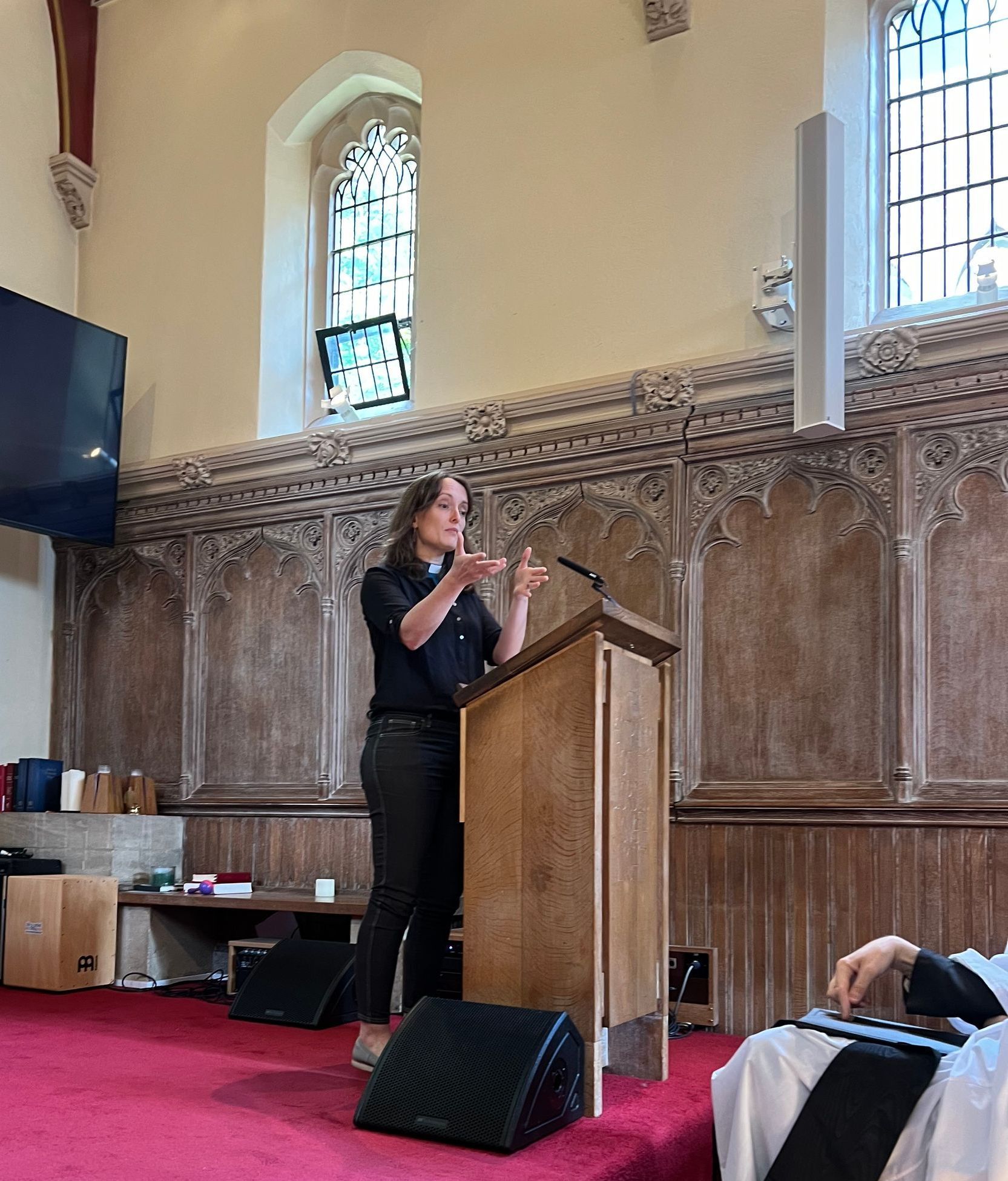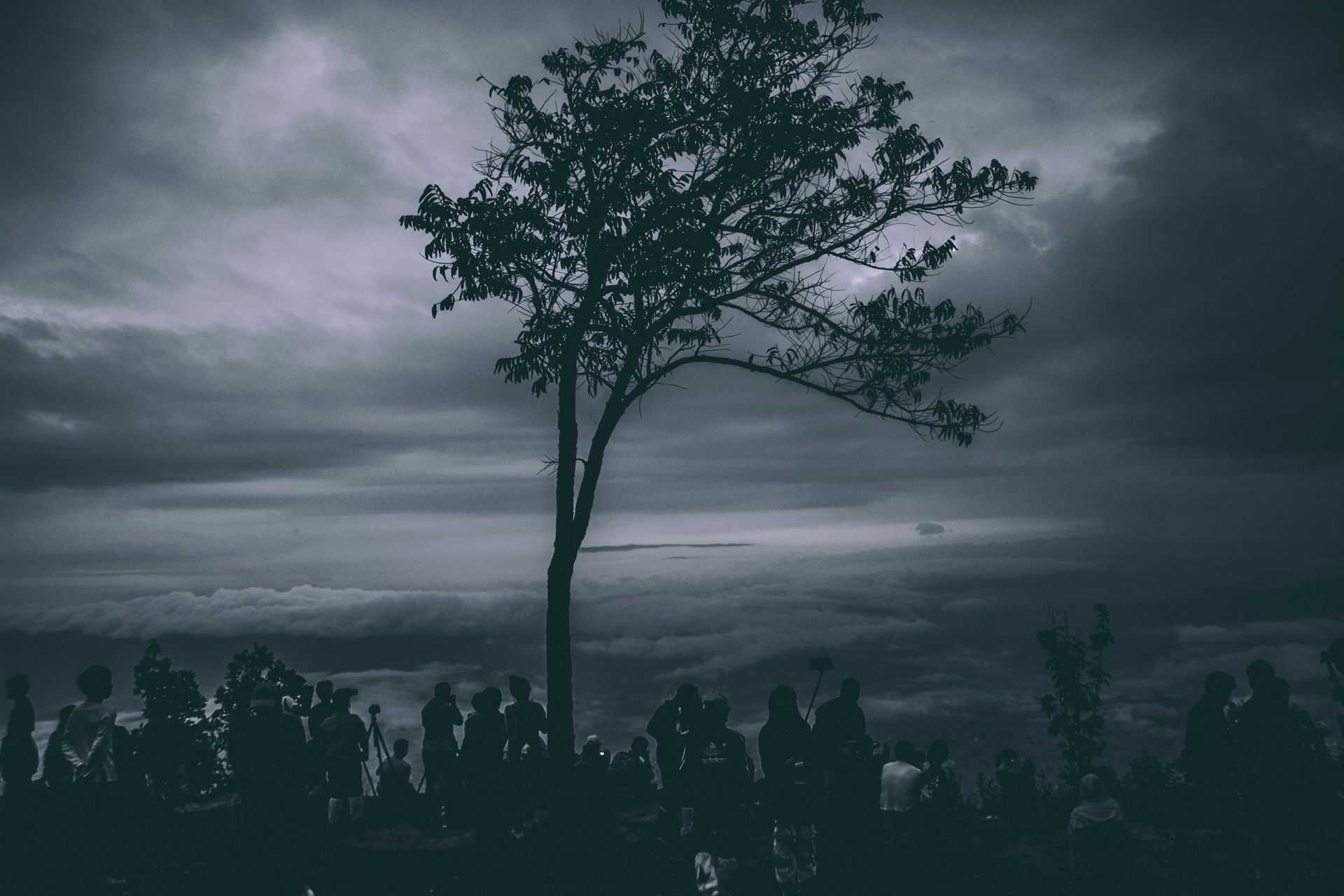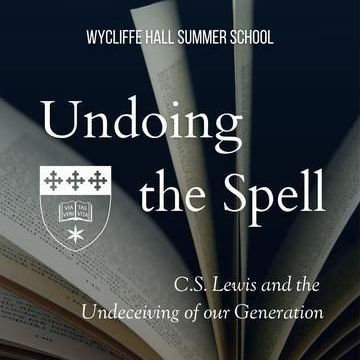So it’s a really good thing to be able to gather and pray and learn this week and spend time reflecting on the God we worship and what it means to proclaim the gospel “afresh in each generation.” The task in every century, every decade of the church’s life, has involved grappling with the reality of a world that is not quite the same as the one we were born into. One in which technology changes, but also one in which people are facing different challenges, different opportunities, and are often asking questions about life and meaning from a different vantage point, a different lens. How do we share we the good news of God in Christ to today’s world? A world where AI is not the stuff of sci-fi but of today? A world that holds so much beauty and life and opportunity for goodness but also a world of conflict, confusion and fear?
Sermon: God's Noble Cedar (Ezekiel 17:22-24)
A sermon I gave at the opening service of the Friends of Wycliffe Hall Summer School 2024. The readings were Ezekiel 17:22-24 & Mark 4:26-34.
About two or three weeks ago, I came across a phrase that was entirely new to me: the “millennial pause.” If you don’t know what it is, let me enlighten you! The two youngest generations of those who’ve reached adulthood are Millenials and Gen Zers. Both are digital natives: they grew up with the internet, cellphones and social media, to some degree. The “millennial pause” describes how when it comes to creating content to put on Instagram or whatever, someone from the older of the two generations—a Millenial—will often pause at the start of their video. Why do they do this? Because older technology took a few seconds to engage when you pressed record. You couldn’t start talking right away otherwise it might not make it onto the video. Gen Zers, on the other hand, laugh at Millenials because they know that the tech today is much quicker to engage when you hit that red button. They also know that if you want someone to watch your video on Instagram or TikTok, you mustn’t waste a second.
With time, things change. Technology advances. New generations grow up. Culture shifts. And those who were once “in the know” start to join those that went before them and cease being relevant in the way they once were. Whether whether it’s small things or large, the only thing guaranteed in life is that the world around us will change.

Regardless of which generation we’re in, what decade of life, or what changes are taking place before us, the God we proclaim afresh—the God revealed in Jesus Christ remains the same. Both our readings today speak to this God, using the image of a sizeable tree that God will bring about. A tree that despite where it came from—whether a mustard seed in Mark or tender twig in Ezekiel—will grow up to bear fruit and provide protection and safety for the birds of the air.
And today, I want us to spend a little time, considering this image and proclamation of God’s goodness and how He works through the lens of Ezekiel 17.
For these verses from the Old Testament describe a remarkable vision of hope. Read on its own, we can certainly see its optimism. This positive expectation that God is good and brings about good things. Look at what God is going to do! Look at the tree He will grow! Look at his power to bring life! But I want to suggest it’s a lot more than that as well. For this vision of hope is for those for whom such a life seems impossible.
God’s words in Ezekiel 17 are a message for a people who have had their lives upended and homes destroyed, a people who have been taken into captivity in Babylon. A people who’ve seen their young, 18 year old, king- Johiachin- taken as a prisoner of war to a foreign city. A people who’ve had their God-given place of worship, sacrifice and renewal of God’s promises and covenant, torn down and left in ruins. These are words for God’s people of Judah, facing the hopelessness of exile.

God here is basically saying:
- “Yes, you have been taken into captivity, but I will bring you back.” In v.22 God declares he will uproot and set out the sprig. He will plant a tender one on the mountain top. In v.24, it is God who can bring low and dry up or raise up and cause to flourish. “One day, you will again be part of a vast tree that provides life and nourishment and safety. Yes, you’re under a foreign empire who is far more powerful than you are. Yes, the life that you knew has been shattered. But it’s not forever. I will do it.”
- “Yes, your king has been taken by the Babylonians, but I will bring one of his descendants to the throne.” That’s what it means when God says He will take a tender twig from the topmost branch and plant it on the high mountain. Much earlier in the chapter, in verse 4, this branch seemed hopelessly stuck in a foreign city under foreign rule. But God will be faithful to his promise. He’ll not forget his chosen king, Jehoiachin.
- “Yes, it looks likes everyone but you has power right now. Yes, it looks like the Babylonians—and their gods—have won, but I am not done yet. One day, my work will be done and all the trees of the field will see it.” Yes, right now, Babylon looks to be vastly more powerful. Yes, it looks like God is anywhere but present. But God is the God who brings low the high tree, and dries up the green one. One day, all will see it to be so.
While centuries apart, this sounds remarkably consistent with the God we know through the event of Good Friday, Holy Saturday and Easter Sunday. A God who rescued us from the impossible exile of our sin and alienation from God. All that burdens, shames and weighs us down. He has made it possible for us to be brought back. A God who brought us back from the exile of death, our risen king and has seated him on high. A God who, to echo Mary’s words in the Magnificat, brings down the proud and lifts up the lowly. A God before whom all powers will one day bow and surrender.
No matter the challenge of today. No matter the circumstance. But God demonstrates his own love for us in this: While we were still sinners—captive to the power of sin—Christ died for us. (Romans 5:8)
Every day, this is good news in our own lives as followers of Jesus, as we do the work of coming face to face with our shortcomings and failures and being his light in the world. This is a grounding reassurance that we can trust God today, even when we might feel lost and at sea, struggling and fearful and unsure of the way ahead.
Things might seem impossible to us, but it’s never impossible for God.
***
But we are missing a beat if we stop there. Because these three verses of Ezekiel 17 come at the conclusion of a longer message God has for his people.
Yes, these verses are good news for those who are humble enough to admit they need help. But they are a little more challenging for the proud.
God’s people were in exile. The chosen king, Jehoiachin, had been taken captive. But Babylon had then installed a new king, Zedekiah, in Jerusalem. Only Zedekiah wasn’t willing to accept being under the rule of Babylon. He wanted out. So, he started courting a different power, Egypt. Why? To try and negotiate some kind of agreement whereby he could use Egyptian military power to overthrow Babylon and restore God’s promised land—and secure his throne.
Zedekiah’s problem was that he did not want to accept the experience of suffering and being under a foreign power. He did not want to learn the lessons God was wanting to teach his people. He did not want to undergo the humiliation of realising it was their own sin that had brought them into exile in the first place.
And what’s really telling here, is that earlier in Ezekiel 17:7-8, God uses a parable to describe Zedekiah. In it, the king and the people are like a vine, a vine that has been taken and planted and is reaching out for help from the eagle that is Egypt. Why do they reach out? So that (v.8) “it might produce branches and bear fruit and become a noble vine.” Zedekiah wants those things that God will eventually provide in the tree in v.23. A tree with large branches, bearing fruit. A noble cedar.
But here’s the thing Zedekiah didn’t get: success would not come from his own solution. It wouldn’t come via Egypt or trying to avoid suffering.
In fact, he will fail, God says, because he tried to escape. Because he was unwilling to be humbled. Unwilling to be teachable, accept suffering, and trust in God. That’s why v.22 has the emphasis on God, himself, being the one to take and plant.
***
The vision of this tree is good news for the humble. But less so for the proud. And I think this is a harder lesson then we often want to admit. Zedekiah’s plan is politically pretty savvy! Yes, Egypt was the power that had originally enslaved the Israelites in the days of Moses, but who wouldn’t want to think creatively in order to be rid of a present enemy?

My husband and I have been recently watching our way through the TV series Homeland. Its depiction of the CIA is one that lauds this kind of thinking. Political nous. Strategy. Playing for the win. Befriending an enemy in order to overpower or outplay another.
But this is not the way that God’s people are to act. We are not responsible for fulfilling God’s promises. We are not responsible for how He will one day restore and establish his kingdom.
We are responsible for what we do today: whether we’re humble. Whether we’re teachable. Whether we’re willing to trust God’s means and God’s provisions or whether we return to old idols or old enemies to take things into our own hands.
For whoever wants to save their life will lose it, but whoever loses their life for me and for the gospel will save it. What good is it for someone to gain the whole world, yet forfeit their soul?
(Mark 8)
For all those who exalt themselves will be humbled, and those who humble themselves will be exalted. (Luke 14)
***
The Judean exile did not last forever. Just a few decades later, when another generation had come along, Jehoiachin’s grandson, Zerubbabel, brought the people back into the land following the fall of the Babylon.
And that is the same God we worship today. The same God we proclaim today. He brings back the humble from the exile of their sin, as they follow their risen king. He raises the dead. He brings new life. And one day, every generation will see it. The proud will be brought low. All injustices squared away. All unrighteousness dealt with.
One of the desert fathers, Abba Anthony, is reported to have said this: "Let us not lose heart, and let us not think that what we are doing takes too much time or is too great an undertaking, for the sufferings of the present time do not compare to the glory that is going to be revealed to us. Let us not look at the world and think that we have renounced great things, for even the whole world is very small when compared with all of heaven. If we were lords of all the earth and renounced the whole world, once again that would not compare with the kingdom of heaven."
This is the remarkable hope we share afresh in each generation. Regardless of the challenges of this world, even with seismic changes, our God remains the same. He brings back to life. He redeems. He brings low the proud and raises up the lowly.
So let us be teachable, let us trust Him, and let us wait with hope for when his glory will be revealed.
******
Cover photo by Casey Horner on Unsplash
Subscribe to
My Newsletter
Sign up here to receive quarterly updates (and occasional other news blasts) about how ministry is going and our move to the U.K.



